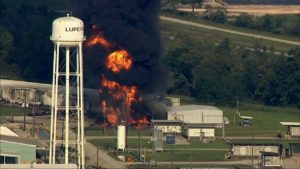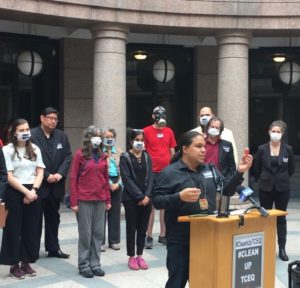86th Texas Legislature Punts on Houston Chemical Fires
Still a chance for interim legislative action
By Michael Coleman
If you’re wondering what the Texas Legislature did to prevent dangerous fires in the Houston’s petrochemical corridor this year, the answer is not much.

Lawmakers held a couple of hearings to take testimony about the fires in early April. But they failed to take any direct action to address underlying causes of the danger. This is despite the fact that frightening, and in one case deadly, evidence of a systemic problem flared up in both March and April.
To recap: On March 16, a fire ignited at the ExxonMobil Refinery in Baytown, Texas. A day later, another fire broke out at the Intercontinental Terminal facility near Deer Park. This blaze raged for days, casting a massive plume of toxic smoke over the region. School children sheltered in place. Traffic in the Houston Ship Channel halted for nearly a week, causing an estimated $1 billion in economic losses.
Less than two weeks later, on April 2, a chemical tank at the KMCO plant in Crosby ignited, once again sending a toxic plume of smoke into the air. This time the fire proved fatal. One KMCO plant worker died and 10 others were injured. One might think three chemical fires in two weeks would prompt urgent bipartisan action by the Texas legislature. That is not the case.

The Legislature did hold two hearings – one on April 4 and another on April 5 – to hear from state and local environmental officials. But affected members of the public were not allowed to speak. Because Houston residents were not invited to testify at the April 5 hearing, Public Citizen, Air Alliance Houston and numerous community activists staged a press conference at the Texas Capitol. The event received significant media attention statewide and ensured that community voices were heard.
During both hearings, Toby Baker, executive director of the Texas Commission on Environmental Quality, admitted his agency lacks the authority to regulate above-ground petroleum storage tanks. Environmental advocates were already supporting SB 1446, a bill by Senator Nathan Johnson of Dallas. This bill granted TCEQ the authority to develop best practices for these tanks. Before these disasters, SB 1446 was dead on arrival. Once it became apparent that TCEQ needed authority over storage tanks, advocates began pushing for a bill hearing.
After considerable pressure was applied to the Senate Water and Rural Affairs Committee and its chairman Senator Charles Perry, the bill finally got a hearing on April 29. Although this hearing did not lead to the bill’s passage out of committee, Chairman Perry stated repeatedly that an interim charge – or special legislative action post-session – is needed on the issue of above ground storage tanks. This commitment would not have happened without our advocacy on the issue.